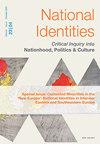从战争(罕见)到疫苗民族主义:理解新民族主义十年的民族主义和外交政策
IF 0.7
Q3 POLITICAL SCIENCE
引用次数: 0
摘要
本文对民族主义和外交政策的国际关系理论进行了批判,并对民族主义研究文献进行了分析。在讨论了民族主义在国际关系中的“矛盾地位”后,文章概述了一种更为折衷和非范式的方法——包含在“民族主义信仰”的概念中——强调认知心理变量的作用,以更细致地理解民族主义与外交政策之间的关系及其相关结果。本文提出了一个新颖的民族主义概念,以更好地理解新民族主义十年的外交政策。本文章由计算机程序翻译,如有差异,请以英文原文为准。
From (the infrequency of) war to vaccine nationalism: understanding nationalism and foreign policy in the decade of New Nationalism
ABSTRACT The article offers a critique of International Relations (IR) theories of nationalism and foreign policy, supplemented by an analysis of the Nationalism Studies literature on the subject. Following a discussion of the ‘paradoxical status’ of nationalism in IR, the article outlines a more eclectic and non-paradigmatic approach – encapsulated in the concept of ‘nationalist beliefs’ – that emphasises the role of cognitive psychological variables to generate a more nuanced understanding of the relationship between nationalism and foreign policy and related outcomes. The article proposes a novel conceptualisation of nationalism to better understand foreign policy in the decade of New Nationalism.
求助全文
通过发布文献求助,成功后即可免费获取论文全文。
去求助
来源期刊

NATIONAL IDENTITIES
POLITICAL SCIENCE-
CiteScore
1.70
自引率
0.00%
发文量
37
期刊介绍:
National Identities explores the formation and expression of national identity from antiquity to the present day. It examines the role in forging identity of cultural (language, architecture, music, gender, religion, the media, sport, encounters with "the other" etc.) and political (state forms, wars, boundaries) factors, by examining how these have been shaped and changed over time. The historical significance of "nation"in political and cultural terms is considered in relationship to other important and in some cases countervailing forms of identity such as religion, region, tribe or class. The focus is on identity, rather than on contingent political forms that may express it. The journal is not prescriptive or proscriptive in its approach.
 求助内容:
求助内容: 应助结果提醒方式:
应助结果提醒方式:


